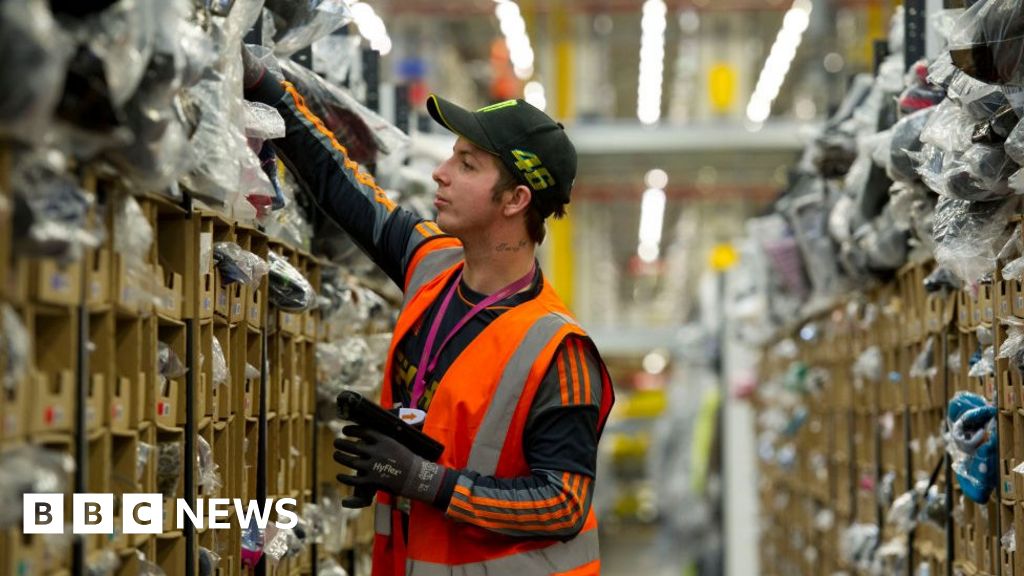Coronavirus: Amazon Blocks Non-essential Items From Warehouses

 Image copyright
Getty Images
Image copyright
Getty Images
Amazon is temporarily refusing to stock certain items in its warehouses, to cope with overwhelming demand for household essentials due to the coronavirus pandemic.
It means third-party sellers of non-essential items could find it difficult to ship orders to customers.
The move will last until 5 April and cover warehouses in the US and Europe.
Some items – including many brands of toilet paper – remain out of stock on Amazon’s UK website.
The decision to restrict warehouse stocks to household essentials and medical supplies has been met with dismay by some sellers of other products.
“My sales just doubled and Amazon halted all my shipments,” said one in a post on discussion site Reddit.
“This is absolutely crazy,” wrote another – though they added they had been “prepared” for disruption.
Third-party sellers can still list and sell items on Amazon but they would have to carry out packing and shipping of the products themselves.
Amazon told the BBC: "We are temporarily prioritising household staples, medical supplies, and other high-demand products coming into our fulfilment centres so we can more quickly receive, restock, and deliver these products to customers. We understand this is a change for our selling partners and appreciate their understanding."
Amazon was "doing the right thing", one US-based seller told the BBC.
"Small businesses will hurt because of it and some will completely go bankrupt if the supply chain disruption goes beyond a month," said Samantha Morrison, who sells a range of electrical and computer-related goods via Amazon.
She said it was nonetheless important that Amazon remained able to provide essential items to people in a time of need.
Ms Morrison added that she thought her own business would be minimally impacted as she had enough stock to "weather the storm".
Andrew Helgeson, a seller based in Lincoln, said he had "no idea" how many fewer orders he would be able to ship because he has been relying on Amazon's services for eight years.
Mr Helgeson sells items including DVDs and Blu-ray discs and said he would have to switch to packaging the products individually himself at home.
"We will get around it, always do, you have to be able to adapt," he told the BBC.
He added that he had already applied for a three-month mortgage holiday from his bank and would be seeking other government help.
Are you a third-party Amazon seller affected by this decision? Share your experiences by emailing haveyoursay@bbc.co.uk.
Please include a contact number if you are willing to speak to a BBC journalist. You can also contact us in the following ways:
- WhatsApp: +44 7756 165803
- Tweet: @BBC_HaveYourSay
- Please read our terms & conditions and privacy policy
From Chip War To Cloud War: The Next Frontier In Global Tech Competition
The global chip war, characterized by intense competition among nations and corporations for supremacy in semiconductor ... Read more
The High Stakes Of Tech Regulation: Security Risks And Market Dynamics
The influence of tech giants in the global economy continues to grow, raising crucial questions about how to balance sec... Read more
The Tyranny Of Instagram Interiors: Why It's Time To Break Free From Algorithm-Driven Aesthetics
Instagram has become a dominant force in shaping interior design trends, offering a seemingly endless stream of inspirat... Read more
The Data Crunch In AI: Strategies For Sustainability
Exploring solutions to the imminent exhaustion of internet data for AI training.As the artificial intelligence (AI) indu... Read more
Google Abandons Four-Year Effort To Remove Cookies From Chrome Browser
After four years of dedicated effort, Google has decided to abandon its plan to remove third-party cookies from its Chro... Read more
LinkedIn Embraces AI And Gamification To Drive User Engagement And Revenue
In an effort to tackle slowing revenue growth and enhance user engagement, LinkedIn is turning to artificial intelligenc... Read more

